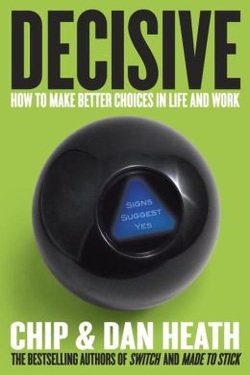
Villain # 1: Narrow Framing. Narrow framing means that you are not considering all the alternatives available to you–you are defining your choices too narrowly. Narrow frame thinking would be when you are asking yourself if you should take a certain action or not, or which of two actions would be better. For example, should you fund Agency A or Program B? Should you emphasize early childhood or High School graduation? Restricting yourself to two choices limits your alternatives. You may not even consider options that would be better.
The likelihood of narrow framing in community decision making is directly proportional to the degree to which the "table" is populated by only folks working in the present system. You want subject matter experts but you don't want to be overwhelmed by the usual subjects setting the frame. I've tried to get these community discussions to, what I call, 50% neutrality. That is 50% of the folks don't make their living from activities on the subject nor carry a fiduciary responsibility to an organization dedicated to the subject. They are neutral to the activity or program but 100% DEDICATED to the changed state. It is often not either or but rather both and that propels us to outcomes. Here the "working differently" habit #4 of keeping the circle open is so valuable.
Karyn Hall, PhD, adds this insight which is of particular interest in the context of community members dedicated to "doing something." Being aware of narrow frame thinking is particularly important to emotionally sensitive people. When emotionally sensitive people face a decision, they tend to become more emotional than others and their thinking tends to narrow more than the person who is not emotionally sensitive. With awareness, the emotionally sensitive can take steps to widen their view.
Villain # 2: Confirmation Bias. Confirmation bias means that when you want or believe an idea to be true, you pay more attention to the information that supports that belief. People naturally tend to select information that supports their preexisting attitudes, beliefs and actions.
This is why in working differently communities, we see a sequencing of data gathering which flows FROM discussions of what we as a community want to achieve or what we aspire to become rather than take up a lot of data gathering about the present state. Because that data picture of the present state tends to be narrow frame (problem rather than solution) and bias toward what we already are doing. How many "fact finding" surveys conclude with the need to fund more of what we are already doing? "Working differently" habit #6 is most helpful here: choose measurable outcomes.
Villain #3: Short-term Emotion. Short-term emotion will pass and is not useful in making a long-term decision. Short-term emotion clouds thinking. When you are emotional about a decision, you might replay arguments over and over until you can’t think straight, even though the facts have not changed. You may also only be thinking emotionally, such as wanting a red sports car that is impractical for you in the long run.
In a community systems context, this can be seen as defensiveness. Good people, doing good things who, while hampered by the present system from getting good results, feel put upon by "new-comers" asking why "you" aren't achieving certain results. This tends to perpetuate a cycle of blaming things actually, or perceived to be, outside of these good people's control. Which then tends to create a lot a busy work about what is presently being done rather keeping the focus on what needs to be done differently across the community.
It is only in a "safe" place where folks who have been doing the community's heavy lifting are respected and see that clarity regarding the shared outcome is a full answer to their prayers for resources and tools all aimed at moving the needle on the outcome. This is the shared we're-all-in-this-together buoyancy provided by the working differently habit #5: avoiding the blame game.
Villain #4: Overconfidence. Overconfidence is believing that you know what the future holds. Some years ago people generally believed the Internet would never catch on and no one would pay for television programs. Many years ago people were confident the earth was flat. In everyday life it might be that you are absolutely positive that a certain philosophical or ideological banner is the right one for you (even though there is no meaningful evidence that it achieves the desired state) or that getting into a certain grant is the only way to achieve your goals. Being overconfident leads to not considering alternatives or what might happen if your choice doesn’t work out well. Being overconfident about the future can lead to unfortunate outcomes.
That is why the final habit of highly successful communities is so telling: develop a sense of urgency and keep going. You are on a journey to discover what you don't know about achieving transformative change. You are passionate about getting there and you are humble about knowing that tomorrow you will know more than today ...
To be tweeted links to my new posts -- blog, book reviews (both nonfiction and fiction), data or other recommended tools -- either go to Twitter.com and follow me @jcrubicon, or just go to my Home page and click on the Twitter button on the right, just above the tweet stream, and follow me @jcrubicon.
 RSS Feed
RSS Feed
